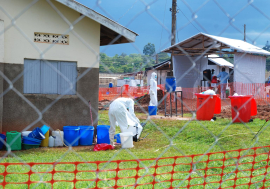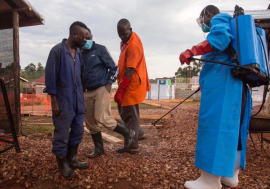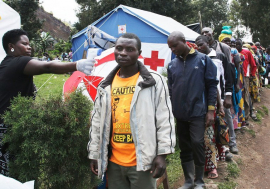Ebola disruption could spark new food crisis
Ebola disruption could spark new food crisis
As Guinea, Liberia and Sierra Leone battle the deadly Ebola virus outbreak and the world mobilizes to contain it, high food prices have been reported as farmers abandon their fields in the affected countries.
The International Fund for Agriculture Development (IFAD), a UN body that finances agriculture in poor countries, has warned that this could lead to a food crisis if adequate measures are not taken quickly to safeguard agricultural production.
As early as September 2014, the Liberian government reported that large parts of the rice crop could not be harvested in the central, northern and western parts of the country because of shortages of labour. Yet, local communities were not allowing farm workers to be hired from outside the country for fear they would bring the Ebola virus.
“In Sierra Leone, we have information that up to 40% of farms in the hardest-hit areas have been abandoned,” IFAD President Kanayo F. Nwanze told Africa Renewal. In Guinea, similar disruptions in population movements have had “devastating effects on food production and exports”. In the Fouta Jalon region of Guinea, for example, Mr. Nwanze pointed out that potato exports to Senegal dropped to 22 tonnes from 250 tonnes the previous year.
As a result of these disruptions, including restrictions of movements in food production areas, wholesale prices on distribution markets have plummeted while retail prices have skyrocketed on local markets. “In August, the wholesale price of a kilogramme of potatoes fell from 3,500 to 200 Guinean francs,” Mr. Nwanze said.
In Liberia, wholesale food prices started falling in mid-September in major markets in the capital Monrovia, according to the agriculture ministry, because farmers were concerned about produce spoilages from produce delays at checkpoints along the road to the city.
At the same time, the Food and Agricultural Organization (FAO) reported that initial results from quick assessments showed prices of commodities, including food, increased on average from 30% to 75% just over one month in Lofa County, the most affected rural county in Liberia.
Empirical observation at the Red Light Market, one of the biggest market places in Monrovia, also revealed huge increases in the price of staple food and commodities such as cassava by (150%); palm oil (53%), gari (obtained from grated cassava) (100%), fresh pepper (133%) and plantains (66%) over a period of two weeks in August 2014.
Agriculture, including small-scale farming, contributes to between 20% and 40% of the gross domestic product of the affected countries, according to Mr. Nwanze. The IFAD head is calling for contingency measures such as building food stockpiles in the affected countries or at the regional level “to be able to provide massive food assistance where and when needed.” If possible, he said, countries should intensify food production in non-affected areas.
About $30 million would be needed to respond to those in need, including food relief for about 90,000 households in the three countries, says the FAO. A Regional Response Programme for West Africa, to be implemented by the FAO in Guinea, Liberia and Sierra Leone, will aim to boost income and agricultural production.



















